The nurse handed her the baby, wrapped tightly in soft blankets, but her eyes drifted lower. Just beneath the neat C-section incision, another mark stretched faintly across her skin. It didn’t look raw like the C-section scar. But it looked like a mark that had been waiting to be found.
At first, she thought it was just swelling or some natural fold from the pregnancy. But when she touched it, the raised line felt different. It ran diagonally, jagged in places, unlike the clean surgical cut above it. Something about it unsettled her more than she wanted to admit.
Days later, while the doctor examined her stitches, she pointed at the line. “What about this?” she asked lightly. He froze. The color drained from his face, and for a moment, his mouth opened without sound. Then he muttered, “I’m so sorry…”
When Linda first saw the two pink lines, her breath caught. Excitement tangled with fear. She and her husband had hoped for this moment, yet the reality of pregnancy pressed down harder than she’d imagined. Nausea struck early, relentless waves that turned everyday life into a constant test of endurance.

Her body changed quickly. Fatigue wrapped around her bones, and every small task felt heavier. She tried to mask her discomfort, smiling for family photos and baby announcements. But when no one was looking, she curled up in bed, whispering to herself that she wasn’t sure she could manage.
As the months passed, complications began. Elevated blood pressure meant more hospital visits, endless monitoring, and whispered conversations between nurses. She clung to the sound of her baby’s heartbeat during scans, making it an anchor against her fears. Each week felt like a fragile victory barely earned.

Labor arrived too soon, fierce and unrelenting. Hours stretched into an ordeal of pain and exhaustion. The contractions clawed at her, breaking every illusion of strength she thought she had. When the baby’s heart rate dipped, the room shifted. Suddenly, doctors moved with alarming urgency, voices sharp with instructions.
The decision was made swiftly. A C-section. She remembered the cold sting of antiseptic, the flood of anesthesia, the bright lights overhead. Her husband’s hand trembled in hers as they wheeled her into the operating theater. Fear and surrender blended until all she could do was close her eyes.
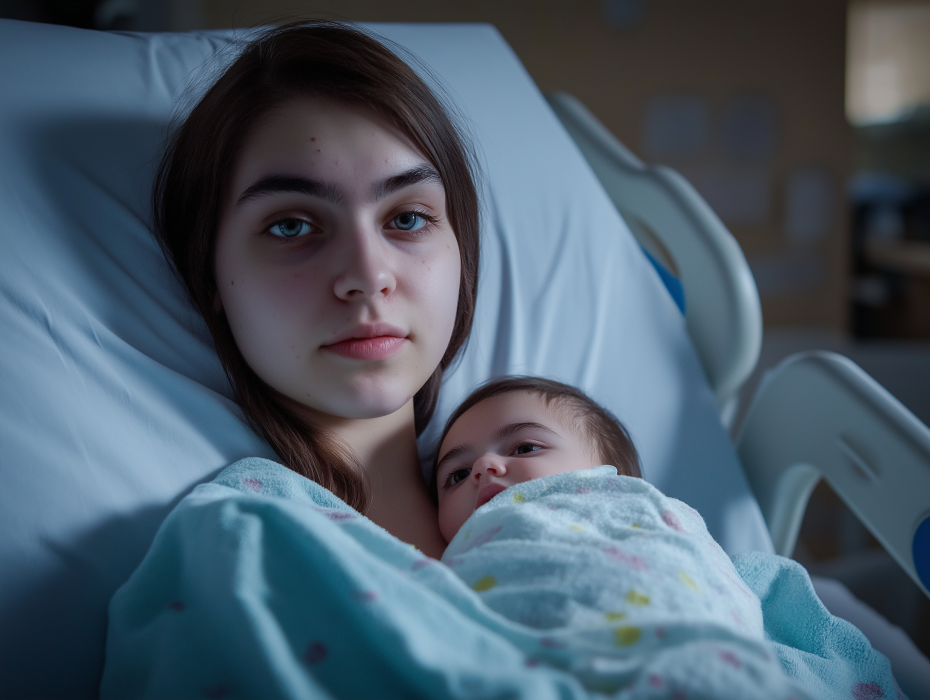
When she woke, the baby was already crying somewhere close. Relief hit first, flooding her eyes with tears. But beneath the gratitude lingered a hollow ache, the knowledge that her body had been opened and altered forever. She told herself the worst was behind her. She was wrong.
She caught the shift in the doctor’s tone when he mumbled, “It’s just scar tissue…”, and the way he glanced quickly at the floor before moving on. It was the kind of dismissal that wasn’t casual at all. The kind that left her with more questions than answers. It clung to her thoughts long after he left.

Her husband brushed it off. “Bodies change, right? You just carried a baby for nine months.” But she wasn’t convinced. She knew what her body looked like before. She had studied it enough times in mirrors, in swimsuits, in photographs. This scar had not been there.
At night, when the baby finally slept, she found herself standing in the bathroom, lifting her shirt under the harsh yellow light. The C-section incision was healing, but above it, the other scar appeared more pronounced. She traced it with her fingertip, as if touching a question carved into her skin.

Nurses avoided her eyes whenever she brought it up. One even changed the subject quickly, asking about breastfeeding instead. Their unease only fed her suspicion. If this was normal, why did everyone seem so uncomfortable? Why was her body telling a story that no one wanted to explain?
She tried to laugh it off during the day, but the scar was always there, pressing against her clothes, whispering from beneath the healing layers. It was like having a secret written on her body, one she couldn’t remember agreeing to, and no one else seemed willing to acknowledge.

Her thoughts turned darker. What if something had gone wrong in surgery? What if they had cut her twice, and now they were covering it up? She remembered the doctor’s pale expression, the stammer in his voice. It didn’t seem like just medical detachment. It was fear.
The questions kept her awake as much as the newborn’s cries. Even as she fed her baby, she thought, why was there no explanation? Why did she feel like her body carried someone else’s story—one that had been hidden from her until now? Each time she closed her eyes, she saw that scar more clearly than ever.

In the days that followed, the odd scar began to ache. It wasn’t sharp pain, but a dull, dragging sensation that flared when she moved. Every time she bent to lift her baby, it tugged, as though something beneath her skin was reminding her it didn’t belong there.
She mentioned the discomfort to a nurse during a midnight check. The woman’s polite smile faltered for the briefest second, her eyes flicking toward the scar. Then, just as quickly, she changed the subject to breastfeeding tips, her voice unnaturally bright, leaving the question dangling unanswered in the air.

Another nurse reacted the same way, her expression tightening as soon as the scar came up. She gave a vague reassurance—“These things sometimes happen after surgery”—but her glance lingered too long, betraying unease. To the new mother, it felt less like reassurance and more like practiced evasion.
Her husband remained unconvinced. “You’re overthinking, Linda,” he told her, adjusting the baby’s blanket. “You just had a major surgery. Of course, you’ll feel strange twinges.” He spoke with the calm certainty of someone who wanted the problem to vanish, but his words only deepened her sense that no one was listening.

She tried to accept his logic and quiet her restless thoughts. But the sensation didn’t fade. At times, it burned faintly, while other times, it felt heavy, as if something foreign pressed against her from the inside. No reassurance could erase the truth her body was whispering.
Every evening, she studied her reflection. The scar seemed more visible each day, standing apart from the neat C-section line above it. She couldn’t decide if it was genuinely darkening or if her own obsession made it sharper. Either way, the silence around it gnawed at her resolve.

Home again, she tried to push the worries aside, focusing on sleepless nights feeding the baby. But the scar itched beneath her clothes, a constant reminder. When the baby finally napped, she sat at her desk and requested her full surgery records from the hospital’s patient portal.
The documents arrived a few days later, lines of sterile language and codes. She scrolled eagerly, searching for any mention of a second incision. But there was nothing. Just the neat description of her C-section, the routine notes of anesthesia and closure. No trace of the mark carved into her skin.

Frustration tightened her chest. She reread the files again, convinced she had missed something. But the language never changed. Her “lower transverse incision” was clean and uncomplicated. The records insisted her body told one story, yet the mirror showed another. She felt trapped between two conflicting truths.
She dug out old insurance paperwork, dusty folders tucked in the back of a drawer. Page after page listed doctor visits, prescriptions, and wellness checks. There was no mention of an emergency surgery or hospitalizations from her childhood. According to the files, she had lived a life untouched by the scalpel.

One night, after she soothed the baby into sleep, she was exhausted but restless. She scrolled back through old photographs on her phone. Summer trips, weddings, swimsuits. She zoomed in on every shot, studying her abdomen. The C-section scar was new, but the other line? Not a trace. It had never been part of her body before.
She showed the photos to her husband. “See? Look at me before the delivery. Nothing.” He squinted, then shrugged. “Bodies change, love. Skin stretches, marks show up. You’re still healing.” His casual dismissal felt like a dismissal of her sanity. She wanted an explanation, not platitudes.

Her friends tried to soothe her worries, too. Over coffee visits, they shook their heads and told her she was overanalyzing. “Pregnancy does weird things,” one said. Another added, “You’re probably just noticing lines that were always there.” Their words didn’t land. Her instincts screamed otherwise.
Alone at night, she pressed her palm against the scar and whispered, “Where did you come from?” Linda was neither vain nor paranoid. She was certain something had happened to her that she couldn’t remember. And this something, though erased from paper, was carved into her flesh all the same.

The more she searched, the deeper her unease grew. Why was everyone so quick to brush it off? Why did her files erase any possibility of an earlier operation? The silence around it felt orchestrated, a wall built to keep her from a truth she wasn’t meant to uncover.
She promised herself she would not stop. If the hospital files and insurance records wouldn’t give her answers, she would dig deeper. Somewhere, hidden in the folds of forgotten history, the scar’s story was waiting. And she intended to find it—no matter what it revealed.

Linda pulled out a shoebox of printed photographs from her teenage years, flipping through images of beaches and pool parties. In each one, she scrutinized her abdomen. Smooth skin, unbroken by lines. The absence of anything stung as fresh evidence. The scar was not a trick of memory—it was undeniably new.
The realization chilled her. If it wasn’t recorded, and it wasn’t there before, then what was it? A part of her wanted to laugh, to call herself dramatic. But another part whispered darker possibilities, ones she didn’t dare say aloud.

Added to this was her ballooning guilt. Here she was obsessing over a scar. Wasn’t this supposed to be the “best” time of her life? One in which her main task was to bond with her baby? Was she a “bad” mum, not giving enough time to her newborn?
Sometimes, in the stillness of night, her imagination spiraled. What if the scar wasn’t from her C-section at all? What if they had cut her for another reason? She’d read stories of patients waking with scars from surgeries they never agreed to. Could she have become one of them?

The scar seemed to pulse with her heartbeat. Each time she touched it, she felt a faint throb, as if something beneath the skin resented her probing fingers. She caught herself flinching away, afraid of her own body, as though the truth lay buried beneath that stubborn ridge.
Her husband sighed when she raised the subject again. “You’re scaring yourself,” he said gently, taking the baby from her into his arms. “It’s just scar tissue. Nothing sinister.” But his soft dismissal again deepened her isolation. To him, it was only a mark. To her, it was a riddle that needed to be solved.

Days blurred into restless loops of research. She scoured medical forums, message boards, and anonymous blogs. Some posts described unexplained scars after surgeries, dismissed by doctors as “adhesions” or “stretch marks.” But her scar didn’t match. It had the precision of a scalpel, a deliberate hand.
She began to catalog its changes. Each morning, she lifted her shirt in the bathroom mirror, documenting it with her phone. In the harsh light, the scar looked darker, almost angry, as though defying the silence of her medical records. It wanted to be seen, even if no one believed her.

Her parents visited one afternoon, bringing food and gifts for the baby. Over tea, she blurted out the question: “Did I ever have surgery as a child?” They exchanged startled looks, then shook their heads. “No, sweetheart. Never. You were a healthy little girl.”
The swift denial pricked at her. She wanted to believe them, but did their eyes give them away? Did something flicker there, a hesitation so brief, she was almost ready to ignore it? On the other hand, was it paranoia, as her husband was suggesting? Was the tiredness of new motherhood finally making her doubt everyone and everything?
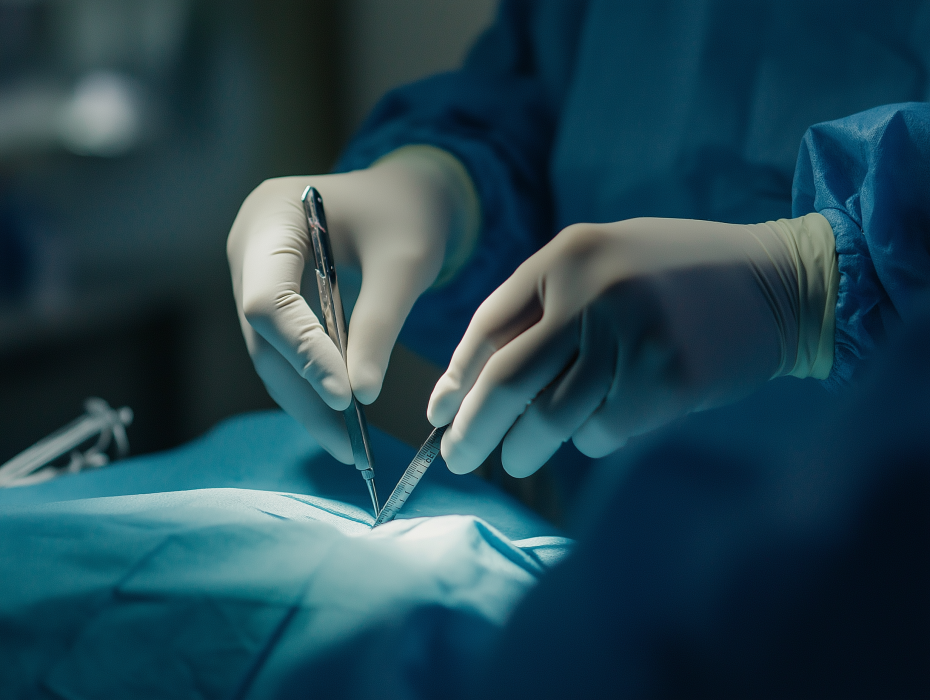
That night, her dreams turned restless. She saw hospital corridors, sterile lights, and the sound of scissors snipping thread. She woke sweating, her hand pressed against the scar as though guarding it. She quickly checked on the baby, whispering to herself that she wouldn’t stop until she knew. Until someone admitted what they’d done.
Unable to bear the silence, she booked an appointment with a different physician. The new doctor examined her carefully, fingertips pressing along the scar. His brows furrowed. “This doesn’t look recent,” he said quietly. “I’d say it’s years old—long before your C-section.” Her stomach dropped at his words.

She blinked at him, searching for reassurance. “But I’ve never had surgery before. Never.” The doctor hesitated, glancing again at the scar as if it betrayed her own certainty. “It’s unmistakable,” he replied. “This is an incision scar. Someone operated on you.” The finality in his tone rattled her.
Walking home, she felt like the ground shifted beneath her. An old surgical scar? How could that be true? Childhood memories reeled through her mind, hospital visits for colds, vaccinations, the usual scrapes and fevers. Never surgery or the sterile theater he described. At least, not that she remembered.

That night, she confronted her parents again. “Are you sure? Nothing when I was little? Not even an emergency?” They looked at each other, then shook their heads more firmly than before. “No, darling. Absolutely not. You’d remember.” Their certainty rang hollow, like actors repeating lines in the wrong scene.
Her husband tried again to anchor her fears. “Maybe the doctor’s wrong. Maybe it’s something else—stretch marks, adhesions. Bodies heal strangely.” He kissed her forehead before moving to the sleeping baby, but she felt his detachment. He wanted her to stop asking, to stop circling the question that now consumed her every waking hour.

But she couldn’t. Every glance in the mirror, every tug of pain beneath the skin, reminded her of the secret no one would acknowledge. The second doctor’s words echoed: Someone operated on you. The conviction in his voice had lodged itself inside her, impossible to shake free.
She tried to tell a close friend, hoping for clarity. Over tea, she explained everything, voice shaking. Her friend frowned, then said softly, “Maybe you just don’t remember. Kids forget things. Maybe your parents thought it wasn’t important.” But the theory only deepened her confusion. How could she forget a surgery? How could they deem it unimportant?

That evening, her husband found her staring at old photographs again. “You’re torturing yourself, Linda,” he whispered, pulling the baby into his arms. But she shook her head. “No. Someone is lying to me. I just don’t know who yet.” Her voice carried a steel edge he hadn’t heard before.
Even as she rocked her child to sleep after feeding, the scar seemed to burn beneath her shirt. It was no longer just skin—it was a question mark carved into her body. And the more others denied it, the sharper her need for answers became.

By the time morning came, she had decided. If her family wouldn’t tell her the truth, she would find it herself. Hospitals, archives, and medical records—she would scour every path until the silence broke. She would not dismiss the scar. She owed herself the truth, no matter how painful it was.
Days passed, and instead of fading, the scar grew sharper. The skin around it puckered slightly, as if healing from an ancient wound. She ran her fingers along its length, shivering at the realization—it wasn’t disappearing with recovery. It was surfacing, declaring itself with unnerving clarity.

Her husband finally noticed. One evening, while she changed clothes, he paused. “It really is different,” he admitted reluctantly. His tone lacked reassurance this time. Instead, unease flickered across his face. She caught it and felt both vindicated and unsettled. Even he could no longer deny its presence.
He tried to downplay it afterward, but the words hung between them. For the first time, she sensed his confidence falter. “Maybe we should get another opinion,” he muttered, carefully avoiding her eyes. His sudden shift made her realize he was scared too, though he didn’t want to say it aloud.

That night, the baby slept fitfully, and as he rocked the baby to sleep, she noticed how his hands trembled slightly. His earlier dismissal had cracked. She wondered if he feared for her health, or if, like her, he sensed something deeper—something wrong not just with her body, but with the story surrounding it.
Their trust frayed quietly. Each conversation about the scar ended with his sighs, her sharp retorts, and silence stretching afterward. The house felt heavier, as if even the walls knew they were drifting apart under the weight of unanswered questions. She no longer felt like her fears were hers alone.

When her parents called to check on the baby, she kept her voice distant. She didn’t ask again about her childhood, though the question pulsed on her tongue. Their earlier denials felt too polished, too final. She couldn’t shake the sense that they were hiding more than they admitted.
One afternoon, as sunlight cut through the curtains, she caught her reflection while nursing. The scar gleamed faintly, angry against her pale skin. She whispered aloud, “You don’t belong here.” Speaking to it felt strange, but also necessary. The silence from others left her needing to fill the void herself.

She began to document every change with meticulous detail. Measurements, photographs, and written notes. If no one else would take her seriously, she would gather evidence herself. Each entry in her journal felt like staking a claim to the truth, brick by brick against the wall of denial.
Her husband stumbled upon the journal one evening. Flipping through the pages, his face tightened. “You’re obsessed,” he said softly, closing it. “This isn’t healthy. You should be focused on the baby’s needs now.” She snatched it back, fire in her eyes. “Obsession is the only thing that will get me answers and I’m not neglecting our child.” Her voice left no room for doubt.

In the stillness of the night, she lay awake, her baby breathing softly beside her. The scar burned faintly under her palm, alive with secrets. The more people resisted her questions, the more determined she became. Whatever truth lay buried beneath that line, she would unearth it, alone if necessary.
At her six-week follow-up, she couldn’t contain herself. She pointed to the scar again, her voice sharper this time. “Explain this, doctor. Why is it here?” The doctor’s composure cracked. His lips tightened, his gaze flicked to the chart in his hands. “It’s… scar tissue,” he repeated, unconvincingly.

She refused to back down. “Scar tissue doesn’t form a surgical line.” Her insistence turned the room colder. He finally muttered, “I can’t discuss this further.” The phrase felt rehearsed, like a door slammed shut. She walked out trembling with rage, certain he knew more than he admitted.
Determined, she requested her full medical file directly from the records department. Weeks later, an envelope arrived. She opened it at the kitchen table, spreading the pages wide. They were thin, and incomplete. But they covered her basic immunizations and minor illnesses over the years. Yet there were gaps, entire stretches of years with no record at all.

Her fingers shook as she traced the missing timeline. Some childhood visits she remembered vividly, like stitches in her knee after a playground fall, and a bad flu hospitalization, were absent. The omission felt deliberate now, not accidental, as if someone had curated her history, choosing carefully what should survive and what should vanish.
When she confronted the records clerk, the woman’s polite smile stiffened. “Sometimes files go missing, especially older ones,” she said. But her tone lacked conviction, and her eyes darted away. It wasn’t just missing paperwork. It felt like a purposeful cleaning of a past someone wanted forgotten.
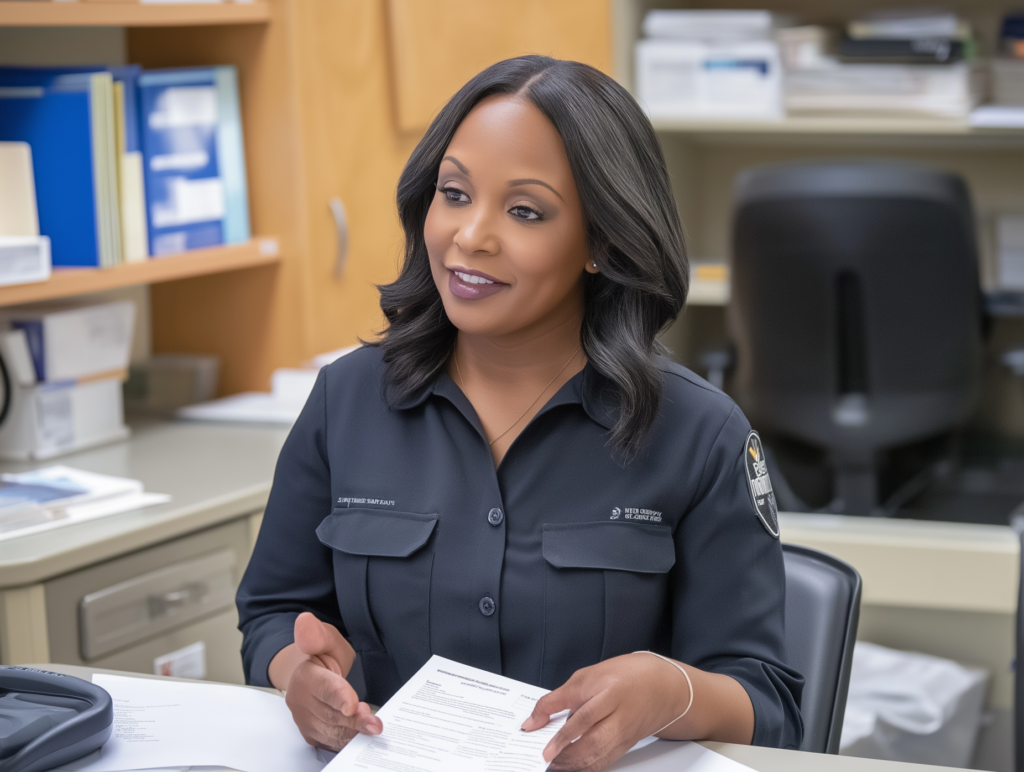
She called her parents again that evening, desperation sharpening her voice. “Why are there missing health records? Why does it look like parts of my childhood were erased?” Silence lingered on the line before her mother answered softly, “You’re imagining patterns. There’s nothing to hide.” The gentleness only enraged her more.
Her father’s voice joined in, firmer. “You’re tired. You’ve just had a baby. Don’t invent ghosts.” Their words dripped with dismissal, but she caught the hesitation in his pause. He was covering up something. She hung up trembling, certain now that the truth lived in what they refused to say.
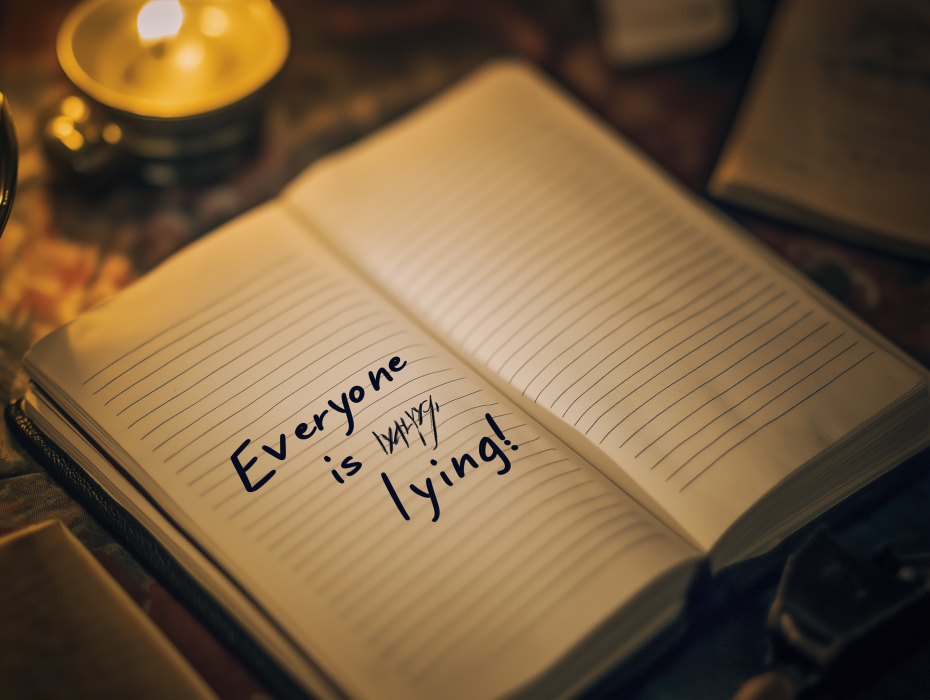
That night, she sat awake with her journal, scribbling furiously. “Everyone is lying,” she wrote, her hand aching from the force of her pen. “This scar means something, and I will find out what. I won’t let them gaslight me into silence.” Tears blurred the ink. The unanswered questions circled tighter, leading her toward a confrontation she no longer feared.
One day, she arrived at her parents’ house unannounced, baby in tow. The air felt heavy with unsaid words. “No more denials,” she said, her voice breaking. “Tell me the truth about this scar.” Her mother’s face paled. Her father looked away, jaw tight, the silence louder than any answer.

Her mother’s hands trembled as she reached for the baby’s blanket, stalling for time. Finally, her voice cracked. “When you were three, you nearly died. Your appendix ruptured. They rushed you into surgery..This was before…” The nervous confession landed like a stone in still water, rippling through her, but there was more.
Her father spoke next, his tone heavy. “Linda, we adopted you after this. You were so young, you seemed to forget. We couldn’t tell you about the surgery without revealing why we didn’t have a record for it. We never imagined a scar would resurface like this and reveal things we thought best left buried.”
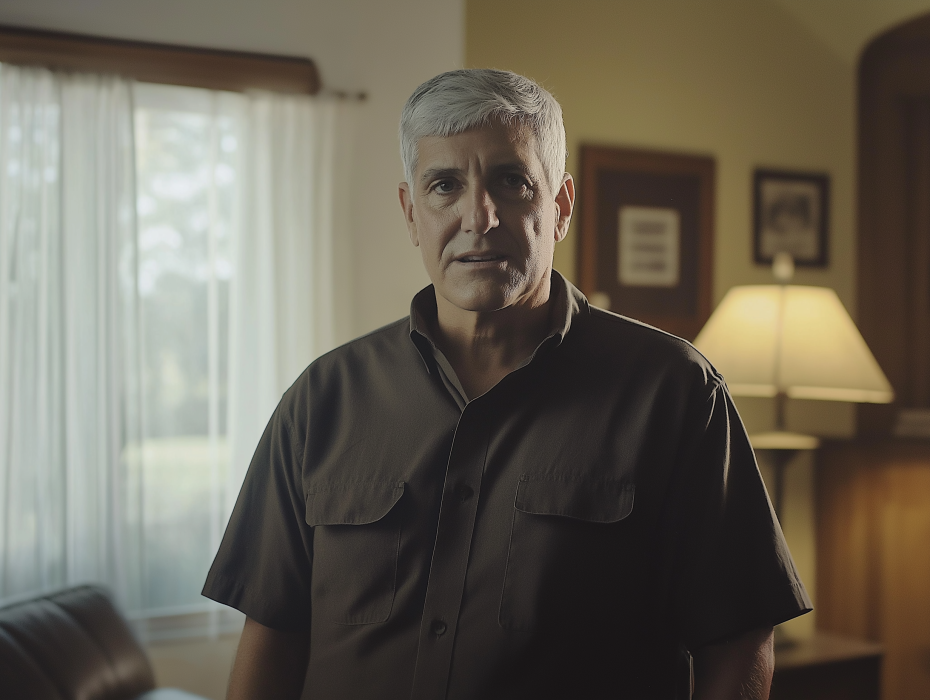
She sat stunned, rocking slightly. “All these years…and you never said?” Her mother’s eyes filled with tears. “We thought we were protecting you. Childhood should be free of such shadows. We were sure you were ours the moment you came home.” But to her, it felt less like protection and more like theft—a piece of her life hidden away.
Her father’s gaze softened. “Linda, to us, you were always our child. We wanted to put your past behind us. We didn’t mean for it to feel like betrayal.” His words struggled under the weight of her silence. The room felt foreign, as if she had stepped into someone else’s family history and found herself written inside. She knew this revelation would take time to process.

Later, she returned to confront the doctor who had gone pale at her question. His shoulders slumped as she told him what her parents had revealed. “There was nothing in your chart,” he admitted. “When I saw the scar, I feared I—the hospital—would be suspected of malpractice—something done during the C-section, undocumented.”
He exhaled heavily. “That’s why I looked the way I did. I wasn’t hiding a secret from you. I was terrified that one existed, without my knowledge, and one in which I would be implicated. Missing records are dangerous, legally and medically. I wanted to protect myself as much as you.” His candor was raw and strangely relieving.
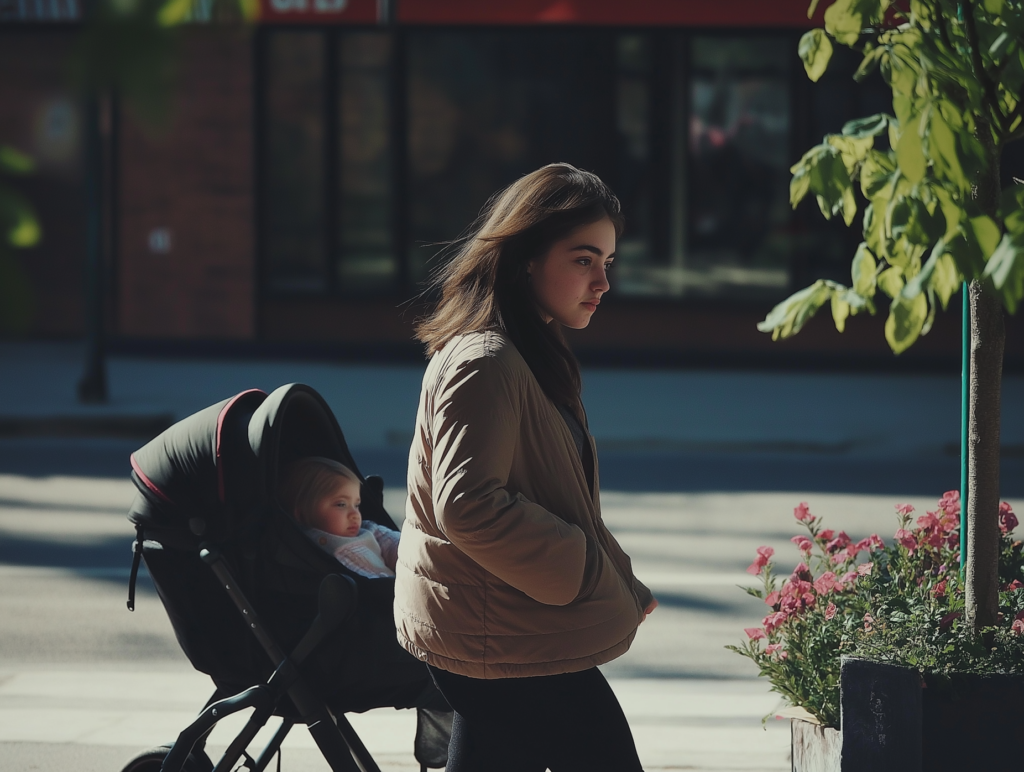
Walking home, Linda felt the scar’s weight shift. It no longer throbbed with menace. It was a reminder of a battle she didn’t remember fighting, a survival etched silently into her skin. The betrayal of silence lingered, but at least the fear was lifted, and replaced by something quieter and heavier—the truth.
That night, holding her baby close, she traced the scar again. It still felt foreign, but now she knew its story. A secret operation, a brush with death, and a second chance she’d been too young to recall, even before she had met her parents. The scar was hers, reclaimed from the shadows.

She kissed her baby’s forehead, whispering, “You’ll know everything. No secrets between us, bub.” For the first time since her C-section, she felt steady. Scars, both old and new, were no longer mysteries to fear, but reminders of survival. The past had surfaced, and at last, it belonged wholly to her.
